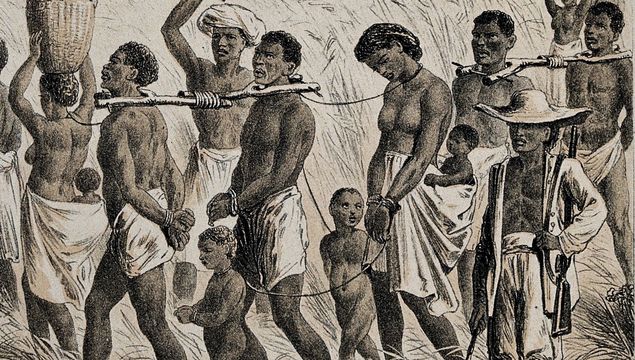- Details
- Written by: Kamran Mofid
- Hits: 3552
This posting was updated on 23 September 2025
Slavery and Colonisation, Plunder and Pillage, Stealing and Thieving, Inhumanity and Cruelty:
The Beginning of the Age of Barbarity

Photo:Wellcome Images
Lest We Forget
‘We are a product of our history—even the history we don’t like to think about.’
Veritas vos liberabit (The truth will set you free)
One of the most effective ways to respond to the inhumanity and injustices of the past is to ensure that the current and future generations do not forget what happened, that we address the harrowing loss of liberty and life, cruelty, the stollen opportunities, as well as the loss of potential forgone earnings and income, racism, xenophobia, inequality, poverty, unfair and abusive trade practices which are totally formulated in the interest of the former colonisers and slave-traders/holders..., and the deprivation that reverberates across centuries to present time. Carpe diem!
- Details
- Written by: Kamran Mofid
- Hits: 1196
We need the wisdom of the indigenous communities to build a better world
GCGI Commemorates and Celebrates International Day of the World's Indigenous Peoples, their Wisdom, Culture and Spirit
"We are all visitors to this time, this place. We are just passing through. Our purpose here is to observe, to learn, to grow, to love… and then we return home”. Australian Aboriginal proverb
"Seek wisdom, not knowledge. Knowledge is of the past, Wisdom is of the future”. Lumbee proverb
"May the guiding voice of Mother Earth, representing all beings of all directions’ expanse of earth, water, air, fire, and space, grant us the nourishment of body, mind, heart, and spirit to serve Her well. May we vow to honor, respect, and tend to the Lands of our Ancestors and the welcoming Lands we call home. May we acknowledge the beings in these lands as Our Kin. May we acknowledge and deeply bow to the rightful stewards of these Lands and wholeheartedly recognize our human and other-than-human relatives displaced and dispossessed of homes and identities. May we become the flourishing garden for all to call home."- Yuria Celidwen
 Photo: Nationalgeographic.com
Photo: Nationalgeographic.com
‘There are an estimated 476 million indigenous peoples in the world living across 90 countries. They make up less than 5 percent of the world's population, but account for 15 per cent of the poorest. They speak an overwhelming majority of the world’s estimated 7,000 languages and represent 5,000 different cultures.
- Details
- Written by: Kamran Mofid
- Hits: 944
Celebrating 50 years of the study of economics as if people matter.
The particular contribution of E. F. Schumacher was to bring a profound wisdom and humanity to bear on the practical pressing challenges of our time. His timeless words ring true today as they did in 1973. Articulating his thoughts and ideas in Small is Beautiful illuminates his thinking and shows the ways in which each one of us, from all walks of life, in every corner of the world, can help to turn our present crisis into the opportunity to build a better more kind, just, spiritual and ecologically sustainable society.
 Photo credit: Dartington Trust
Photo credit: Dartington Trust
On the occasion of the 50th anniversary of the publication of Small is Beautiful, it is my pleasure and honour to offer my homage to E.F. Schumacher and pay tribute to his memory. He enabled and empowered me to think and dream differently, that indeed, economics can be an inspiring subject of beauty, wisdom, hope and virtue.
- Debunking the myth of low vs high-value courses, good, prestigious vs rip-off universities and the so-called economic outcomes
- Was the 45 Days of Travesty, Mayhem and Humiliation Not Enough?
- Thank you and Happy 75th Birthday NHS: You are the Celebration of the Common Good
- Everything debased, devalued and tainted by Johnson’s lies and deceit must be nulled and undone, including Brexit
- Thank you Ian Gregg for Who you are and What you do
